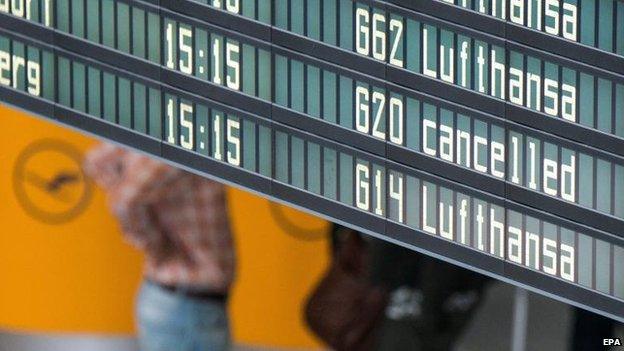Lufthansa pilots' strike expanded to long-haul services
- Published

Lufthansa pilots have begun their eighth strike this year, forcing the cancellation of 1,511 flights over Monday and Tuesday.
The strike was initially aimed at mostly European flights, but will be expanded to international routes on Tuesday, hitting 200,000 passengers.
Lufthansa said that the strike, over changes to retirement and pensions terms, would hit profits and its image.
But the Vereinigung Cockpit (VC) union said it wanted to send a clear message.
Last week, VC called out its members at Lufthansa's budget airline, Germanwings, for a 12-hour stoppage.
The union, which represents about 5,400 Lufthansa pilots, is calling on the airline to reconsider its decision to raise the age that they can retire from 55.
The company has offered to retain the scheme for existing members but not to extend it to new recruits.
VC said Lufthansa was "stonewalling" over talks. Union board member Markus Wahl said: "We are extending the strike in order to send a clearer signal. Perhaps now, Lufthansa will finally come round."
But Simone Menne, Lufthansa's chief financial officer, said in a statement: "The strikes are not only causing significant financial damage but are also damaging our image, the consequences of which are significant and not yet clear,"
The airline said it hoped to operate a third of its flights over the two days.
Rail strike
The Lufthansa strike follows a walk-out over the weekend by railway drivers.
The train drivers' strike was over demands by the GDL for a 5% pay for 20,000 drivers and a shorter working week.
The head of the GDL union, Claus Weselsky, said there would be a week-long break before any further strikes.
The German Industry Federation business lobby condemned the strikes, saying they harmed "the entire economy" by affecting logistics, tourism and business travel.
Germany's economy has been slowing recently. However, the Economy Ministry said although the strikes would certainly "impact some sectors of the economy", there was no reason to change the 2014 growth forecast which was lowered this month to 1.2%.
Germany's government is expected to produce a draft law later this year aimed at stopping small numbers of employees paralysing large parts of the country's infrastructure through strike action.
- Published15 October 2014
- Published8 October 2014